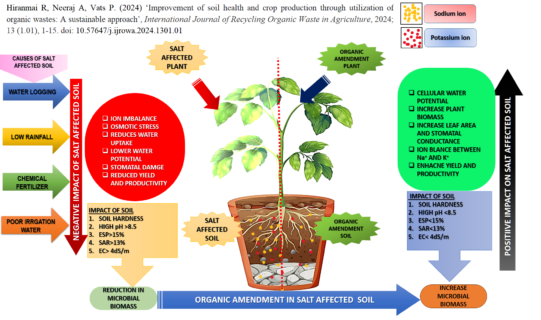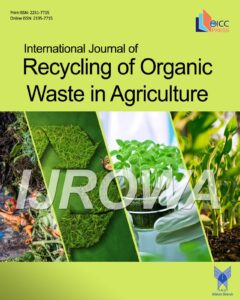Improvement of soil health and crop production through utilization of organic wastes: A sustainable approach
Authors
- R.Y. Hiranmai 1
- Ajay Neeraj * 1
- Parul Vats 1
Abstract
Purpose: Solid organic waste is a major environmental issue in various parts of the world. Proper management techniques
for disposing of such wastes can reduce health issues as well as contamination of the environment. Modern scientific
techniques in conjugation with traditional practices can manage biowaste in an efficient, economical, and sustainable
manner. This present review highlights the possibilities of utilizing biowastes from various sources for the enhancement of
soil fertility, residue management, crop growth and higher yields.
Methodology: The article is prepared from secondary materials i.e. research and review articles published in different
journals. The review of literature from these articles in terms of soil quality, salinity, impact of salinity on crop production
and possibilities to reclamate saline soil to improve productivity of soil were systematically carried out. A summary of the
present work was developed using the following approach.
Result: Various management practices, in-situ and ex-situ techniques help reduce biowastes and transform them into
useful nutrients that could be applied to soil for alleviating the nutritional deficiency in saline/sodic soil. Composting using
microbes and earthworms has been traditionally practiced for reducing/converting waste into compost and applying them
to agricultural fields to improve soil fertility and crop productivity.
Conclusion: Using waste management techniques and converting biowaste into manure for enhancing agricultural
productivity provides sustainable agriculture practices in addition to pollution reduction.
Research highlights
· Using solid organic waste management techniques to address major environmental issues is crucial.
· By combining scientific techniques with traditional practices, biowaste can be managed in an efficient and sustainable way, minimizing health risks and environmental contamination.
· In-situ and ex-situ management practices, as well as composting, improve soil fertility and crop productivity by transforming waste into nutrients.
· A variety of biowastes can contribute to increased soil fertility, greater crop yields, and reduced residues.




